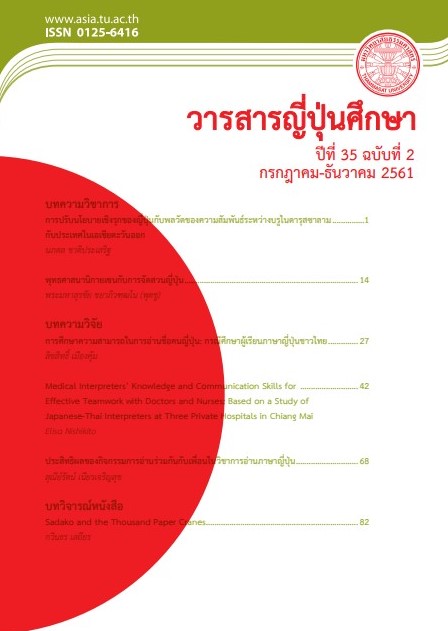Medical Interpreters’ Knowledge and Communication Skills for Effective Teamwork with Doctors and Nurses: Based on a Study of Japanese-Thai Interpreters at Three Private Hospitals in Chiang Mai
Keywords:
Japanese-Thai interpreters, Knowledge and communication skills, Teamwork with doctors and nurses, RecommendationsAbstract
The objective of this study was to identify and discuss factors that can help Japanese-Thai interpreters enhance their performance when working with doctors and nurses in order to provide proper care for Japanese patients. Data were collected at three private hospitals in Chiang Mai, Thailand, via in-depth interviews with doctors, nurses and interpreters; and at the Long Stay Life Club (CLL) office with patients. The interviews were voice-recorded and transcribed verbatim. Analysis was carried out from a sociolinguistics and cross-cultural
communication perspectives, and the results were presented in a descriptive way. The results
revealed the following factors that affect the interpreter’s performance: (1) medical knowledge; (2) language proficiency; (3) cross-cultural understanding; (4) understanding the differences in health beliefs and health protocols; and (5) interpersonal relationship skills. Based on these results, some recommendations for interpreters to handle these issues were presented: (1) deepen medical knowledge by understanding the medical personnel’s perspective and work context; (2) pay special attention to onomatopoeic words and use certain communication strategies to express accurately the characteristics of pain and symptoms; (3) keep a flexible attitude to harmonize with the Thai work environment; (4) clarify the differences in health beliefs and health protocols between Thailand and Japan not only to the patient, but also to the doctor; and (5) use communication strategies to voice the patients’ opinions without being intimidated
by the doctor’s position of authority.




